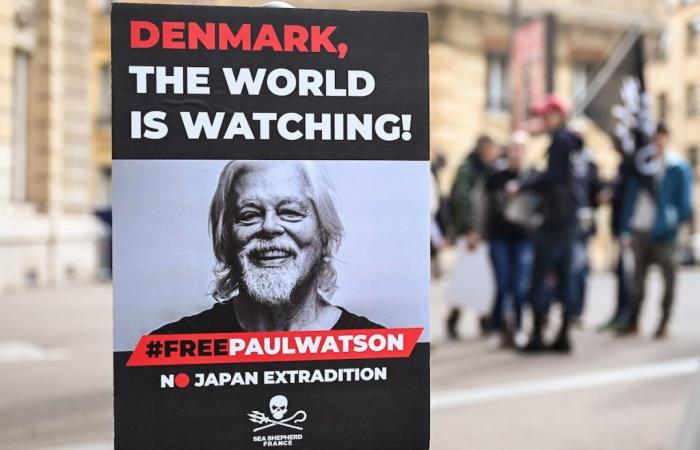A placard with the portrait of Paul Watson during a demonstration near the Danish Embassy, in Paris, on Sept. 23.MARTIN LELIEVRE/AFP/Getty Images
Sue Donaldson and Will Kymlicka are joint conveners of the Animals in Philosophy, Politics, Law and Ethics research group at Queen’s University. They are members of the Philosophy Department, where Mr. Kymlicka holds a Canadian Research Chair in Political Philosophy.
A Canadian-American citizen has just been awarded the Perfect World Foundation’s Conservationist of the Year award, joining such luminaries as Sir David Attenborough and Dr. Jane Goodall. But this same 73-year-old individual is also currently sitting in a jail cell in Greenland, pending possible deportation to Japan where he faces charges that could result in a 15-year prison sentence.
Captain Paul Watson was arrested in Nuuk, Greenland, on July 21 in connection with a 2012 Interpol “Red Notice,” defined by the international policing organization as “a request to law enforcement worldwide to locate and provisionally arrest a person pending extradition, surrender, or similar legal action.” Radio-Canada has covered the political nature of Mr. Watson’s charges – relating to alleged damage made to a Japanese whaling ship in the Antarctic Ocean in 2010 – and their dubious grounds. But if you rely on Canada’s English-language media, you’ve probably missed this story entirely.
Mr. Watson, the founder of the anti-whaling organizations Sea Shepherd and the Captain Paul Watson Foundation, has spent decades fighting for the world’s oceans and their cetacean denizens, often risking his life in confrontations with illegal whaling activities. When arrested, his foundation says he was en route to the northwest Pacific to intercept Japan’s new mega-whaling ship, the Kangei Maru. Japan, which withdrew from the International Convention for the Regulation of Whaling in 2019, has resumed commercial whaling. It claims to hunt only in its own coastal waters, but Mr. Watson suspected that the Kangei Maru, with its enormous 13,000-kilometre range, was in fact headed to the Southern Ocean Whale Sanctuary to hunt. Now we might never know.
The Japanese charges regarding the 2010 Antarctic incident allege that Mr. Watson was a conspirator in the actions of Sea Shepherd member Pete Bethunewho illegally boarded the Shonan Maru, a Japanese whaling ship. Mr. Bethune says he boarded the ship to make a citizen’s arrest stemming from a confrontation the month before. Mr. Bethune was captaining Sea Shepherd’s trimaran boat, the Ady Gil, when it was rammed and sunk in what the Shonan Maru crew claim was an accident. Mr. Bethune was found guilty on five charges by a Japanese court, ranging from trespassing to assault (he had lobbed bottles of rancid butter at the Shonan Maru during the incident), resulting in a two-year suspended prison sentence and five years’ probation.
Mr. Watson’s role in this incident is contested. Regardless, few countries would extradite someone based on such insubstantial charges. Greenland, however, is an autonomous territory of the Kingdom of Denmark. Mr. Watson has actively protested the annual dolphin slaughter in the Faroe Islands (another autonomous region of Denmark), which leads one to question whether Mr. Watson’s detainment might be politically motivated.
French President Emmanuel Macron and other European lawmakers have been calling for Mr. Watson’s release, as have friends of animals from around the world. But where is the voice of the Canadian people and their government? A homegrown conservation hero has been targeted by his political and economic enemies and could spend the rest of his life in jail on spurious charges. Where is the outrage?
In recent decades, powerful lobbies in Canada (for animal agriculture, fishing and hunting, biomedical research, and zoos and aquaria) have attempted to rebrand animal defenders as “eco-terrorists,” and many politicians are now nervous about being associated with the animal cause. Indeed, some politicians have actively contributed to this rebranding by passing “ag-gag” laws, such as Ontario’s Security from Trespass and Protecting Food Safety Act (which, fortunately, was partially overturned earlier this year as a violation of Charter rights by Ontario’s Superior Court). This rebranding has sent a chill through animal defender communities, leading some to be wary of “direct action” (such as confronting ships engaged in illegal whaling).
In failing to come to his defence publicly, Canadian politicians may also be worried that Mr. Watson’s commitment to defending the rights of marine mammals conflicts with Indigenous hunting and fishing rights. But Indigenous peoples in Canada have been at the forefront of protecting animals and their habitats, including strengthening legal protections for cetaceans. Bill S-203, which banned cetacean captivity, was sponsored by prominent former Indigenous senator Murray Sinclair. (And related legislation sponsored by Senator Marty Klyne, Bill S-15, would help end the captivity of elephants and great apes, and is currently before the Senate.)
It seems that Canada doesn’t like its heroes to be aggressive, difficult, or impolitic (perhaps that’s why we don’t have very many?). But make no mistake – to the whales of the world, and the humans who care about them, Paul Watson is a hero.






